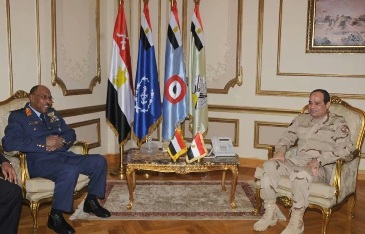Senior Egyptian military commander to visit Sudan soon: official
February 23, 2014 (KHARTOUM) – Sudan’s defense minister, Abdel-Rahim Mohamed Hussein, has announced that the Egyptian Border Guard Commander, Major Gen. Ahmed Ibrahim, would soon visit Khartoum to discuss deployment of joint forces on the borders between the two countries to prevent smuggling and human trafficking.

He told reporters following the meeting that he briefed the members of the subcommittee on the local, regional and international security conditions besides the outcome of his recent visit to Egypt.
The defense minister added that he informed the committee on the security conditions in Darfur, South Kordofan and Blue Nile states as well as the ongoing arrangements with neighboring countries and joint forces stationed on Sudan’s borders with Chad, Libya, and the Central African Republic (CAR) besides the tripartite forces with Ethiopia and Eritrea.
The chairman of the parliamentary subcommittee on Foreign Relations, Security, and Defense, Malik Hussein, for his part said that the parliament would work towards strengthening ties with Egypt and curb parties which seek to weaken them.
He asserted that the defense minister assured that the security situation in the country is under control and the Sudanese Armed Forces (SAF) is holding reins on all battlefronts.
Malik noted that the suspension of negotiations between the government and the rebel Sudan People’s Liberation Movement/North (SPLM-N) would negatively impact South Kordofan and Blue Nile states, calling upon stakeholders to support negotiations track.
He also urged the international community to pressure the SPLM-N to return to the negotiating table.
Meanwhile, the ruling National Congress Party (NCP) has accused the SPLM-N of stalling the recent round of negotiations, affirming it would resume talks with all armed groups besides continuing military operations against those who refuse negotiations.
The head of the NCP’s supervisory committee on organization in the eastern states, al-Hag Adam Yussef, said the SPLM-N intransigence and special agendas have stalled negotiations, saying SPLM-N delegates went beyond their mandate and sought to discuss other issues.
Last Tuesday, the chair of the African Union High-Level Implementation Panel (AUHIP), Thabo Mbeki, announced that talks between Sudan’s government and SPLM-N which sought to end the two-and-half-year conflict in South Kordofan and Blue Nile have been suspended for ten days.
Sources close to the talks pointed that negotiations stalled because the government delegation insisted that the objective of talks is to settle the conflict in the two areas while the SPLM-N delegation called for a holistic approach to solve Sudan’s problems.
The two delegations accused each other of impeding this round of negotiations.
While the government delegation held the SPLM-N delegation responsible for hindering talks, the SPLM-N said that the former sought partial solutions for the crisis.
Adam, who met with NCP youth, woman, and students’ leaders in Sudan’s eastern state of Gedaref, said the government is keen to proceed on negotiations with SPLM-N and other armed groups besides continuing military operations against those who refuse the voice of reason and reject peaceful negotiations.
Meanwhile, the state’s minister at the ministry of information, Yasser Youssef, said peace is a strategic choice for the government, asserting they would work towards completing the peace process in Darfur, South Kordofan, and Blue Nile.
Youssef, who addressed the first meeting of the Information Council on Sunday, added the government would go to the next round of negotiations with the SPLM-N on the two areas in Addis Ababa holding a true belief that dialogue is the only means for solving problems.
He stressed the government delegation would continue negotiations with the SPLM-N on the basis of the UN Security Council (UNSC) resolution 2046, the AUHIP mandate, and the two areas protocols that were included in the 2005 Comprehensive Peace Agreement (CPA).
(ST)
